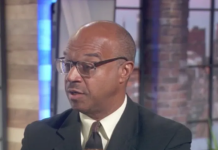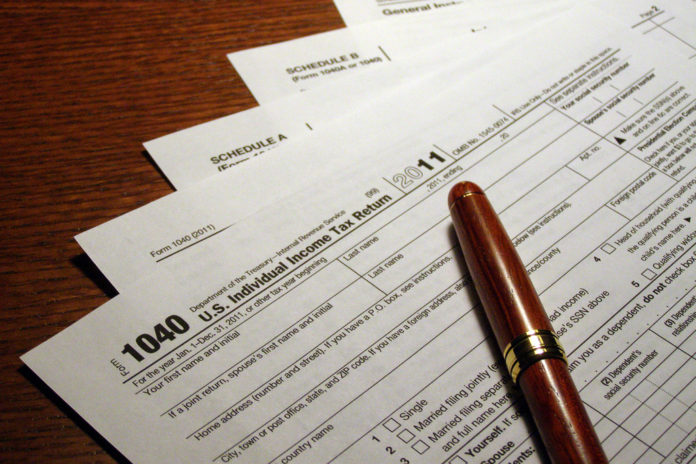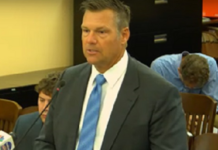For the fourth time as governor, Democrat Laura Kelly will veto a sweeping tax bill, this one moving the state to a single tax rate coupled with speeding up elimination of the state sales tax on food while cutting property taxes and increasing the standard deduction.
The bill, which would have cost state government $1.3 billion in revenue over three years, would have set a new flat tax rate of 5.15% while ending the state sales tax on food this January instead of allowing it to phase out by 2025.
Kelly said the legislation would upend the state’s tax structure, moving it to a regressive system where everyone would pay the same rate regardless of their ability to pay.
Echoing themes from past vetoes of tax bills as well as her reelection campaign, Kelly called the tax plan a throwback to the era of former Republican Gov. Sam Brownback, whose tax cuts were blamed for blowing holes in the state budget
“I refuse to take us back to an era of chronically underfunded schools, four-day school weeks, crumbling roads and bridges and crippling debt,” she said.
She announced her plan to veto the tax bill at Elmont Elementary School in Topeka to highlight how public schools would be affected by the tax cuts.
“There is no doubt, public schools would be the first to take a hit should this bill become law,” Kelly said during her Monday morning news conference.
“I’ve said it time and time again, public schools are the very foundation of our state,” Kelly said.
“Fully funding our schools has proven to be the smartest, best return on investment we can make in the future of our state.”
Kelly further said that the tax plan would benefit the wealthy at the expense of other classes of taxpayers.
“The people who would benefit the most from the flat tax by far are Kansans making more than $200,000 a year,” Kelly said.
“Meanwhile, middle class taxpayers would see less than $8 per month in actual savings,” she said.
The House voted 85-38 for the tax bill with support from Kansas City, Kan. state Rep. Marvin Robinson. Senators approved the tax bill 24-13, three votes short of being able to override a veto from the governor.
Three senators – Chase Blasi of Wichita, Carolyn McGinn of Sedgwick and Tim Shallenburger of Baxter Springs – were absent and didn’t vote on the bill when it was approved late in the night on April 6.
The veto comes at a time when the state is expected to have an ending balance of about $1.9 billion at the end of the current fiscal year and $3 billion the following year although the latter number is expected to be revised.
As an alternative, Kelly proposed a $450 per person tax rebate and a $900 rebate per married couple. The cost is estimated at $800 million.
“Unfortunately, some lawmakers are taking our strong financial position for granted,” Kelly said.
“They think that our record surplus is a license to push through reckless legislation like this tax bill, not recognizing the reality that much of the surplus is one-time money.”
House Speaker Dan Hawkins called the governor’s veto “careless” and “out of touch.”
Hawkins said the tax plan providers relief for all classes of taxpayers, regardless of income.
The tax cuts became a lot easier for Kelly to veto when House Democrats jumped off the bill when the flat tax was reduced from 5.25% to 5.15%.
As the bill originally emerged from the House with a 5.25% flat tax, it had support from 94 members of the House, including the top House Democrat and the ranking member of the House tax committee.
But the tax was lowered during conference committee negotiations as senators pushed for a lower flat tax rate although House members warned that would cost them votes.
Democrats abandoned the plan after the tax rate was lowered to 5.15%, saying that reduction would have mostly benefited the wealthy.
The bill does a number of things, including:
- Provide a single individual income tax rate of 5.15%, starting in tax year 2024, for all Kansas taxable income in excess of $12,300 for married individuals filing joint returns and $6,150 for all other individuals. Kansas taxable income less than those amounts would not be taxed.
- Eliminate the state sales tax on groceries on Jan. 1 instead of phasing it out through 2025. Kelly had called for an immediate phaseout of the food tax. The House plan only applies to the state sales tax. It would not apply to local sales taxes after local government officials implored lawmakers not to cut a vital revenue source.
- Raise the standard deduction for all taxpayers to account for cost-of-living adjustments starting in 2024. It no longer includes an increase in the standard deduction for single filers to $4,000 from $3,500.
- Increase the property tax exemption for the 20-mill levy for public schools from $40,000 of valuation to $60,000 starting in tax year 2023. The bill provides for the amount to increase in future tax years based on the average percentage change in statewide residential real property for the preceding 10 years.
- Cut corporate income taxes to 3% in 2024, which was part of the bill approved last year authorizing tax incentives for Panasonic and other mega development projects. The bill would repeal possible future corporate rate decreases resulting from agreements
under the tax incentives deal approved for future mega development projects. - End the tax cliff on Social Security taxes. Kansans currently don’t pay taxes on Social Security benefits if they earn $75,000 or less a year in federal adjusted gross income from all sources. But if they earn just $1 more than $75,000, they go over a so-called “cliff” when they are hit with a substantially bigger tax bill. The House bill gradually phases in the tax by increasing the threshold to $100,000. Under the bill, for example, if a taxpayer’s federal adjusted income is halfway to $100,000, only half of the Social Security benefits would be taxed. However, the bill also increases that $100,000 cap by $5,000 a year going forward.
- Cut taxes for banks from their overall rate of 4.375% to 3.75% in 2024 and savings and loans from their overall rate of 4.5% to 3.86%.
Throughout her term as governor, Kelly has been reticent about cutting taxes too much for fear that it would damage the budget similar to what happened when taxes were cut when Sam Brownback was governor.
The Kansas Chamber of Commerce said that Kelly’s dire predictions for past tax cuts didn’t come true after a previous veto was overridden in 2021.
“Governor Kelly vetoed tax changes in 2019, 2020, and 2021, saying those proposals would destroy the state’s budget. They didn’t. And this plan won’t either, said Alan Cobb, the chamber’s president and CEO.
“We urge the Kansas Legislature to override this veto to provide Kansas taxpayers the relief they so need,” Cobb said.
Under the current tax system, Cobb said Kansans earning more than $30,000 would pay 5.7% in taxes. Under the new plan, they would pay 5.15% on all income.
In 2019, Kelly vetoed two tax bills approved by the Legislature that were aimed at returning millions in revenue that the state was expected to collect as a result of changes in the federal tax code.
She vetoed one bill that would have given up about $239 million over three years and another that would have cost the state about $500 million in revenue.
Again in 2021, Kelly vetoed another piece of legislation that was intended to do the same thing as the tax cuts approved in 2019. However in 2021, the Legislature was able to override the governor’s veto.
In all three of those vetoes, Kelly said the tax cuts approved by the Legislature would gut the state budget, a theme she sounded again on Monday morning.
“The Brownback tax experiment was a failed experiment,” Kelly said. “Our schools, our teachers, our parents, our families and everyday Kansan paid the price.”
“I ran for governor to get Kansas back on track, balance the budget and fix our broken education system,” she said.
“After years of deficits and budget mismanagement, we now balance the budget and fully funded our schools for four straight years,” she said.
“Some legislators are looking to drive us right into the ditch we just climbed out of.”















